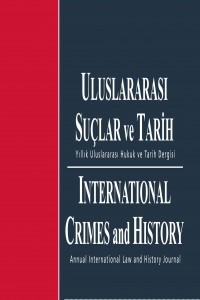
Uluslararası Suçlar ve Tarih
Yazarlar: Jeylan MAMMADOVA
Konular:-
Anahtar Kelimeler:Hodjaly,Massacre,Genocide,Nagorno-Karabakh
Özet: If “more than 600 people were killed” intentionally by onegroup of people on February 26, 1992 in Khojaly, Azerbaijan, why is itthat the dominant member states of the international community—specifically the European Union (EU), the Organization of Security andCo-Operation in Europe (OSCE), and the United Nations SecurityCouncil (UNSC)—have not accepted that the massacre was genocide,while only three states, Mexico, Pakistan and Colombia, have alreadyrecognized it as such (“Pakistani Senate Recognizes” 2012)? Globalpowers do not recognize the case as genocide, not because the killingswere not committed at a level of genocide, but because of two keyfactors: first, confirmation of the occurrence of the genocide does notbenefit their international political and economic interests and second,recognition does not benefit their internal political interests (defined byinterest groups). This research paper develops an existing argument ofthe primacy of the theory of Realpolitik in light of neglected humanrights issues, in this case the Khojaly massacre. The paper builds on themain theory of the clash between human rights and realism and thenoutlines the shortcomings of the limited literature on the Khojalymassacre. The paper focuses on nine countries that have played animportant role in the discussion of the recognition of the massacre (U.S.,Russia, France, Germany, Turkey, Israel, Pakistan, Mexico, and UK),and observes their current approach to the issue through expert opinionand data that strongly yields evidence for the realist approach of certaincountries in discussing the Khojaly massacre